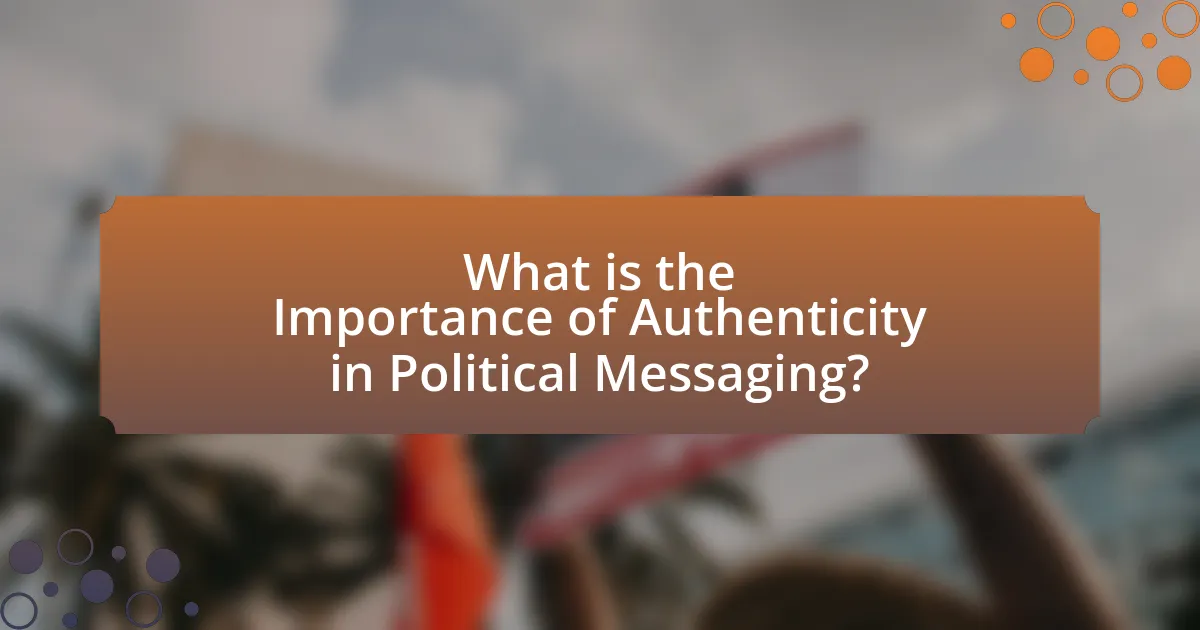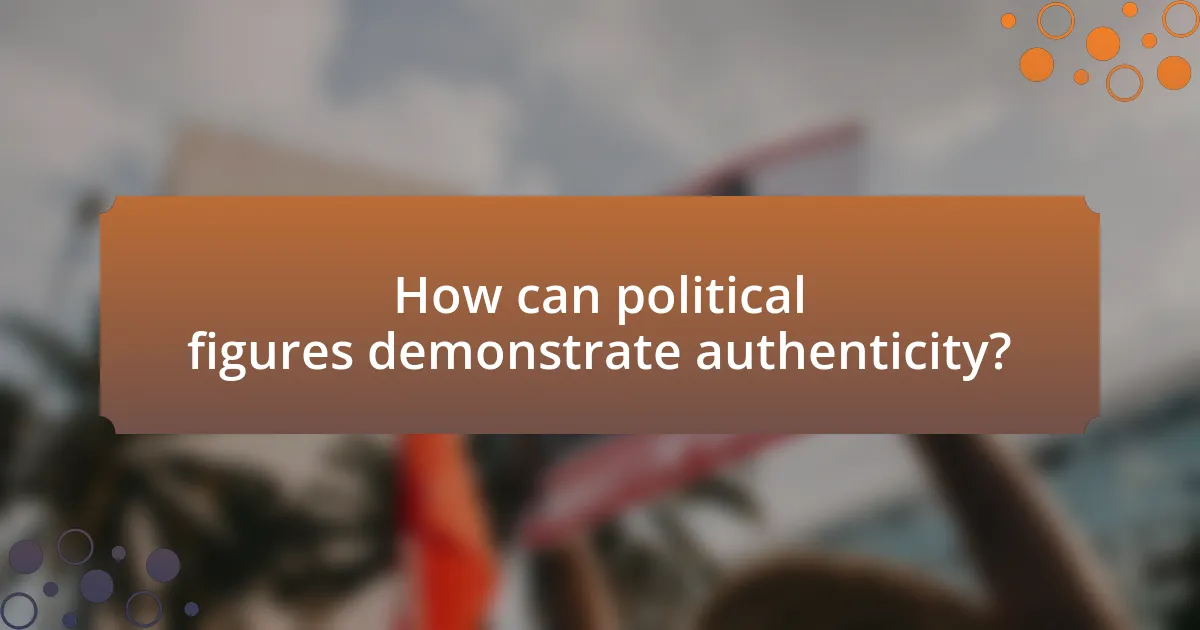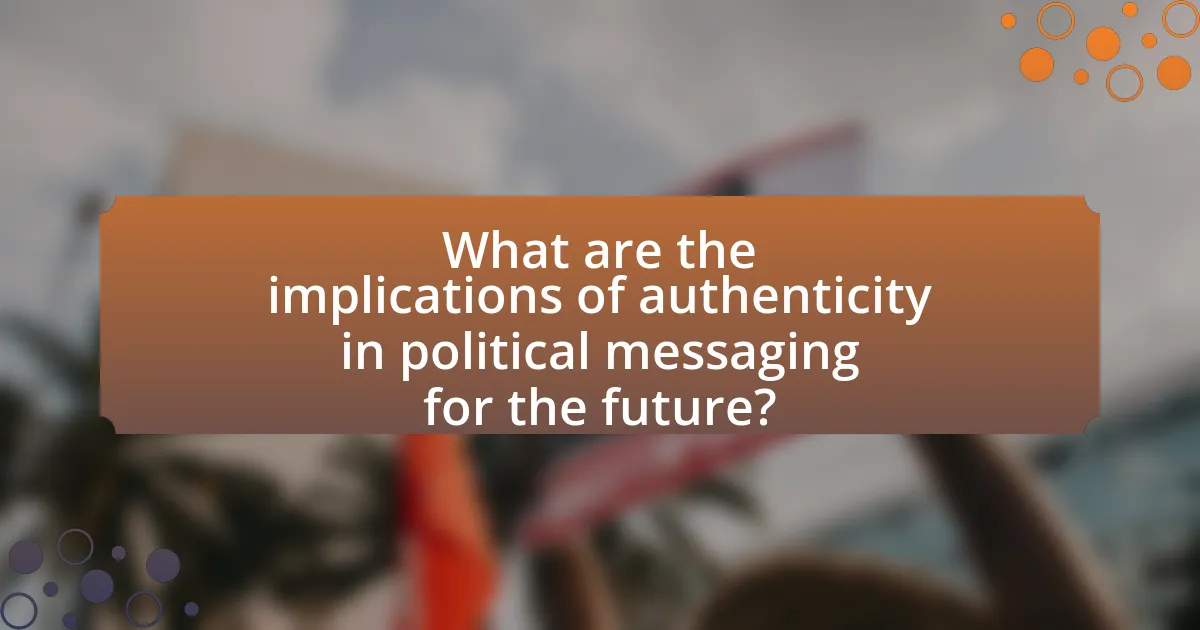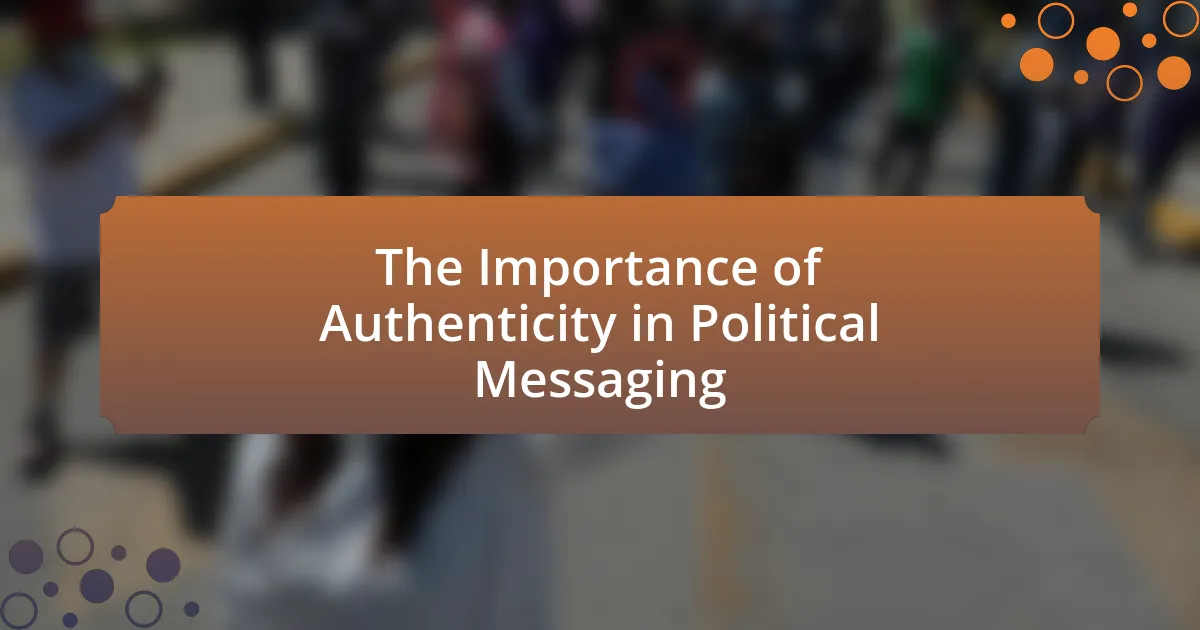The article focuses on the significance of authenticity in political messaging, emphasizing its role in fostering trust and credibility between politicians and their constituents. It outlines key elements that define authenticity, such as transparency, consistency, relatability, and integrity, and discusses how these factors influence voter perception and engagement. The article also examines the impact of authenticity on political campaigns, candidate branding, and strategies for effective communication, while highlighting the consequences of inauthentic messaging, including voter disengagement and erosion of trust in political institutions. Additionally, it provides practical tips for politicians to enhance authenticity in their messaging, ultimately underscoring the importance of genuine communication in strengthening democratic processes.

What is the Importance of Authenticity in Political Messaging?
Authenticity in political messaging is crucial because it fosters trust and credibility between politicians and their constituents. When political messages are perceived as genuine, they resonate more deeply with the audience, leading to increased engagement and support. Research indicates that voters are more likely to support candidates who they believe are authentic; for instance, a study by the Pew Research Center found that 70% of voters prioritize honesty in political candidates. This trust can significantly influence electoral outcomes, as authenticity helps to differentiate candidates in a crowded field, making it a vital component of effective political communication.
Why is authenticity crucial in political communication?
Authenticity is crucial in political communication because it fosters trust between politicians and the electorate. When political figures communicate authentically, they are perceived as genuine, which enhances their credibility and encourages voter engagement. Research indicates that voters are more likely to support candidates who they believe are honest and transparent; for instance, a study by the Pew Research Center found that 70% of Americans value honesty in political leaders. This trust is essential for effective governance and civic participation, as it leads to increased voter turnout and public support for policies.
What are the key elements that define authenticity in political messaging?
The key elements that define authenticity in political messaging include transparency, consistency, relatability, and integrity. Transparency involves openly sharing information and intentions, which fosters trust among constituents. Consistency refers to the alignment of messages with actions and values over time, reinforcing credibility. Relatability allows politicians to connect with the audience on personal and emotional levels, making their messages more impactful. Integrity encompasses ethical behavior and honesty, ensuring that the politician’s actions reflect their stated beliefs. These elements collectively contribute to a perception of authenticity, which is crucial for effective political communication.
How does authenticity influence voter perception?
Authenticity significantly influences voter perception by fostering trust and relatability towards candidates. When voters perceive a candidate as genuine, they are more likely to feel a connection, which can enhance their support. Research indicates that candidates who communicate authentically are viewed as more credible; for instance, a study published in the Journal of Political Marketing found that authenticity positively correlates with voter trust and engagement. This connection is crucial, as voters often seek leaders who reflect their values and beliefs, making authenticity a key factor in electoral success.
How does authenticity impact political campaigns?
Authenticity significantly impacts political campaigns by fostering trust and relatability between candidates and voters. When candidates present themselves genuinely, they are more likely to resonate with the electorate, leading to increased voter engagement and support. Research indicates that voters are more inclined to support candidates they perceive as authentic; for instance, a study by the Pew Research Center found that 70% of voters prioritize a candidate’s honesty and integrity over other traits. This connection can enhance a candidate’s image, making them appear more credible and approachable, which is crucial in a competitive political landscape.
What role does authenticity play in candidate branding?
Authenticity plays a crucial role in candidate branding by establishing trust and relatability with voters. When candidates present themselves genuinely, they foster a connection that resonates with the electorate, leading to increased support. Research indicates that 70% of voters are more likely to support candidates they perceive as authentic, as authenticity enhances credibility and encourages voter engagement. This connection is vital in political messaging, where voters seek leaders who reflect their values and beliefs.
How can authenticity affect campaign strategies?
Authenticity significantly influences campaign strategies by enhancing voter trust and engagement. When political campaigns present genuine messages and relatable candidates, they foster a stronger connection with the electorate. Research indicates that 70% of voters are more likely to support candidates they perceive as authentic, as shown in a study by the Pew Research Center. This trust leads to increased voter turnout and loyalty, making authenticity a critical component in shaping effective campaign strategies.
What are the consequences of inauthentic political messaging?
Inauthentic political messaging leads to a significant erosion of public trust in political institutions and figures. When politicians communicate insincerely, it can result in voter disillusionment, decreased civic engagement, and increased polarization among the electorate. Research indicates that a lack of authenticity can diminish the perceived credibility of political messages, as evidenced by a 2019 study published in the Journal of Political Communication, which found that voters are less likely to support candidates they perceive as inauthentic. This decline in trust can ultimately undermine democratic processes, as citizens may become apathetic or disengaged from participating in elections and civic activities.
How does inauthenticity lead to voter disengagement?
Inauthenticity leads to voter disengagement by eroding trust in political candidates and their messages. When voters perceive candidates as insincere or manipulative, they are less likely to feel a connection to them or their platforms, resulting in decreased motivation to participate in elections. Research by the Pew Research Center indicates that 70% of Americans believe that politicians often say one thing and do another, which contributes to a sense of disillusionment and apathy towards the electoral process. This lack of trust can diminish voter turnout, as individuals may feel that their participation will not lead to meaningful change or representation.
What are the long-term effects of inauthentic messaging on political trust?
Inauthentic messaging significantly erodes political trust over the long term. When political figures or organizations engage in deceptive or misleading communication, it leads to a decline in public confidence in their integrity and reliability. Research indicates that consistent exposure to inauthentic messaging can result in increased cynicism among the electorate, as evidenced by a study published in the Journal of Political Communication, which found that voters exposed to misleading information were 30% more likely to distrust political institutions. This erosion of trust can create a feedback loop, where diminished trust leads to further disengagement from the political process, ultimately undermining democratic participation and stability.

How can political figures demonstrate authenticity?
Political figures can demonstrate authenticity by consistently aligning their actions, words, and values with their true beliefs and commitments. This alignment fosters trust and credibility among constituents, as seen in the case of former President Barack Obama, who maintained a consistent message on healthcare reform throughout his campaign and presidency, reinforcing his commitment to the issue. Additionally, transparency in decision-making processes and open communication with the public further enhances perceived authenticity, as evidenced by politicians who engage directly with their constituents through town hall meetings and social media platforms.
What strategies can politicians use to convey authenticity?
Politicians can convey authenticity by engaging in transparent communication, demonstrating vulnerability, and actively listening to constituents. Transparent communication involves sharing honest information about policies and decisions, which builds trust; for example, politicians who openly discuss their challenges and mistakes are often perceived as more relatable. Demonstrating vulnerability, such as sharing personal stories or admitting uncertainties, humanizes politicians and fosters a connection with the audience. Active listening, where politicians genuinely consider and respond to constituents’ concerns, reinforces their commitment to serving the public and enhances their perceived authenticity. These strategies are supported by research indicating that voters are more likely to trust and support candidates who exhibit these authentic behaviors.
How can personal storytelling enhance authenticity?
Personal storytelling enhances authenticity by allowing individuals to share genuine experiences that resonate emotionally with their audience. This connection fosters trust, as audiences perceive the storyteller as relatable and sincere. Research indicates that narratives can significantly influence perceptions; for instance, a study published in the journal “Psychological Science” found that personal stories can evoke empathy and increase the likelihood of agreement with the storyteller’s viewpoints. By presenting their unique journeys, individuals can effectively convey their values and beliefs, reinforcing their authenticity in political messaging.
What role does transparency play in demonstrating authenticity?
Transparency is crucial in demonstrating authenticity as it fosters trust and credibility between individuals and their audience. When political figures openly share information about their decisions, motivations, and actions, they create an environment where constituents feel informed and valued. Research indicates that 70% of voters are more likely to support candidates who are perceived as transparent, highlighting the direct correlation between transparency and voter trust. This trust is essential for effective political messaging, as it reinforces the belief that leaders are genuine and accountable, ultimately enhancing their perceived authenticity.
How can social media be leveraged for authentic political messaging?
Social media can be leveraged for authentic political messaging by enabling direct communication between politicians and constituents, fostering transparency and engagement. This platform allows political figures to share their values, policies, and personal stories in real-time, creating a sense of relatability and trust. For instance, during the 2020 U.S. presidential election, candidates utilized platforms like Twitter and Instagram to communicate directly with voters, bypassing traditional media filters, which resulted in higher engagement rates and a more personal connection with the electorate. Studies indicate that authentic messaging on social media can increase voter trust and participation, as seen in research by the Pew Research Center, which found that 69% of adults in the U.S. believe social media is a valuable tool for political engagement.
What are the best practices for authentic engagement on social media?
The best practices for authentic engagement on social media include fostering genuine interactions, actively listening to your audience, and sharing relatable content. Fostering genuine interactions involves responding to comments and messages in a timely manner, which builds trust and encourages further dialogue. Actively listening to your audience means paying attention to their feedback and preferences, allowing for more tailored and relevant content. Sharing relatable content, such as personal stories or experiences, enhances connection and resonates with followers, making them feel valued and understood. According to a study by Sprout Social, 70% of consumers feel more connected to brands that engage with them authentically, highlighting the effectiveness of these practices in building meaningful relationships.
How can politicians respond to criticism while maintaining authenticity?
Politicians can respond to criticism while maintaining authenticity by acknowledging the criticism openly and providing a transparent explanation of their actions or decisions. This approach fosters trust and demonstrates a willingness to engage with constituents. For instance, when faced with backlash over a policy decision, a politician can clarify their rationale, citing specific data or research that informed their choice, such as economic studies or public opinion surveys. This method not only addresses the concerns raised but also reinforces the politician’s commitment to honesty and accountability, which are essential components of authentic political messaging.
What are common pitfalls to avoid in authentic political messaging?
Common pitfalls to avoid in authentic political messaging include using vague language, failing to address the audience’s concerns, and lacking transparency. Vague language can lead to misunderstandings and diminish trust, as seen in political campaigns where unclear messaging resulted in voter confusion. Failing to address the audience’s concerns alienates potential supporters; for instance, candidates who ignore pressing local issues often see decreased engagement. Lastly, a lack of transparency can damage credibility; research shows that voters are more likely to support candidates who openly share their policies and decision-making processes.
How can politicians ensure they do not appear disingenuous?
Politicians can ensure they do not appear disingenuous by consistently communicating their values and beliefs in a transparent manner. Authenticity is achieved through honest dialogue, where politicians share personal experiences and motivations that align with their policy positions. For instance, when politicians discuss their backgrounds and the reasons behind their decisions, they create a relatable narrative that resonates with constituents. Research indicates that voters are more likely to trust candidates who demonstrate vulnerability and openness, as seen in studies conducted by the Pew Research Center, which highlight the correlation between perceived authenticity and voter trust.
What are the risks of over-curation in political messaging?
Over-curation in political messaging can lead to a distorted representation of reality, which risks alienating the audience and undermining trust. When political messages are excessively curated, they may omit critical perspectives or facts, resulting in a biased narrative that fails to resonate with diverse constituents. This lack of authenticity can diminish voter engagement, as individuals may perceive the messaging as manipulative or insincere. Research indicates that authenticity is crucial for effective political communication; for instance, a study by the Pew Research Center found that 70% of voters value honesty and transparency in political messaging. Thus, over-curation not only risks misrepresentation but also jeopardizes the fundamental connection between politicians and their constituents.

What are the implications of authenticity in political messaging for the future?
Authenticity in political messaging will increasingly shape voter trust and engagement in the future. As political landscapes evolve, candidates who communicate genuine beliefs and values are likely to resonate more with constituents, fostering deeper connections. Research indicates that voters prioritize authenticity, with a 2020 Pew Research Center study revealing that 70% of Americans believe it is important for politicians to be honest about their beliefs. This trend suggests that political campaigns emphasizing transparency and sincerity will gain a competitive edge, potentially leading to more informed electorates and increased civic participation.
How is the concept of authenticity evolving in modern politics?
The concept of authenticity in modern politics is evolving towards a greater emphasis on transparency and relatability. Politicians increasingly utilize social media platforms to present themselves in a more personal and unfiltered manner, which resonates with voters seeking genuine connections. For instance, studies show that candidates who share personal stories and engage directly with constituents online tend to foster stronger voter loyalty, as seen in the campaigns of figures like Barack Obama and Alexandria Ocasio-Cortez. This shift reflects a broader societal demand for accountability and sincerity in political discourse, as evidenced by the rise of movements advocating for grassroots engagement and the rejection of traditional, polished political rhetoric.
What trends are shaping the future of authentic political communication?
The future of authentic political communication is being shaped by increased transparency, the rise of social media, and a demand for genuine engagement. Increased transparency is crucial as voters increasingly expect politicians to be open about their policies and decision-making processes, fostering trust. Social media platforms facilitate direct communication between politicians and constituents, allowing for real-time feedback and interaction, which enhances authenticity. Additionally, there is a growing demand for genuine engagement, where politicians are expected to listen to and address the concerns of their constituents, rather than relying solely on traditional campaign messaging. These trends reflect a shift towards a more participatory and accountable political landscape, aligning with the public’s desire for authenticity in political messaging.
How do generational differences affect perceptions of authenticity?
Generational differences significantly influence perceptions of authenticity, as younger generations often prioritize transparency and relatability, while older generations may value tradition and authority. For instance, Millennials and Gen Z tend to favor brands and political figures that demonstrate genuine engagement and social responsibility, reflecting a shift towards valuing personal connection over institutional credibility. In contrast, Baby Boomers and Generation X may perceive authenticity through established reputations and proven track records, leading them to trust figures who embody traditional values and experience. This divergence is supported by research from the Pew Research Center, which indicates that younger individuals are more likely to seek out and support leaders who align with their values and demonstrate authenticity through actions rather than mere rhetoric.
What role does authenticity play in fostering political engagement?
Authenticity plays a crucial role in fostering political engagement by building trust between political figures and constituents. When politicians communicate genuinely and transparently, they resonate more with the public, leading to increased voter participation and civic involvement. Research indicates that voters are more likely to engage with candidates who demonstrate authenticity, as it enhances their perception of credibility and relatability. For instance, a study published in the Journal of Political Marketing found that authentic messaging significantly boosts voter turnout, as individuals feel a stronger connection to candidates who appear sincere and honest in their communication.
How can authentic messaging encourage civic participation?
Authentic messaging encourages civic participation by fostering trust and relatability between citizens and political entities. When messages resonate with the genuine experiences and values of the community, individuals are more likely to engage in civic activities such as voting, attending town hall meetings, or advocating for local issues. Research indicates that 70% of voters are more likely to support candidates who communicate authentically, as shown in a study by the Pew Research Center, which highlights the correlation between perceived authenticity and increased voter turnout. This connection underscores the importance of authenticity in political messaging as a catalyst for civic engagement.
What are the potential benefits of authenticity for democratic processes?
Authenticity enhances democratic processes by fostering trust and engagement among citizens. When political leaders communicate authentically, they are more likely to resonate with the electorate, leading to increased voter participation and civic involvement. Research indicates that authentic messaging can reduce political apathy; for instance, a study by the Pew Research Center found that 70% of voters are more likely to support candidates who they perceive as genuine. This connection encourages a more informed electorate, as citizens feel empowered to engage in discussions and debates about policies and governance. Ultimately, authenticity in political messaging strengthens the democratic fabric by promoting transparency and accountability.
What practical tips can politicians follow to enhance authenticity in their messaging?
Politicians can enhance authenticity in their messaging by prioritizing transparency, engaging in active listening, and sharing personal stories. Transparency builds trust; for instance, politicians who openly discuss their policies and decision-making processes are often perceived as more credible. Active listening involves genuinely considering constituents’ concerns, which fosters a sense of connection and responsiveness. Sharing personal stories humanizes politicians, making them relatable; research shows that narratives can significantly increase voter engagement and trust. By implementing these strategies, politicians can create a more authentic and impactful connection with their audience.
